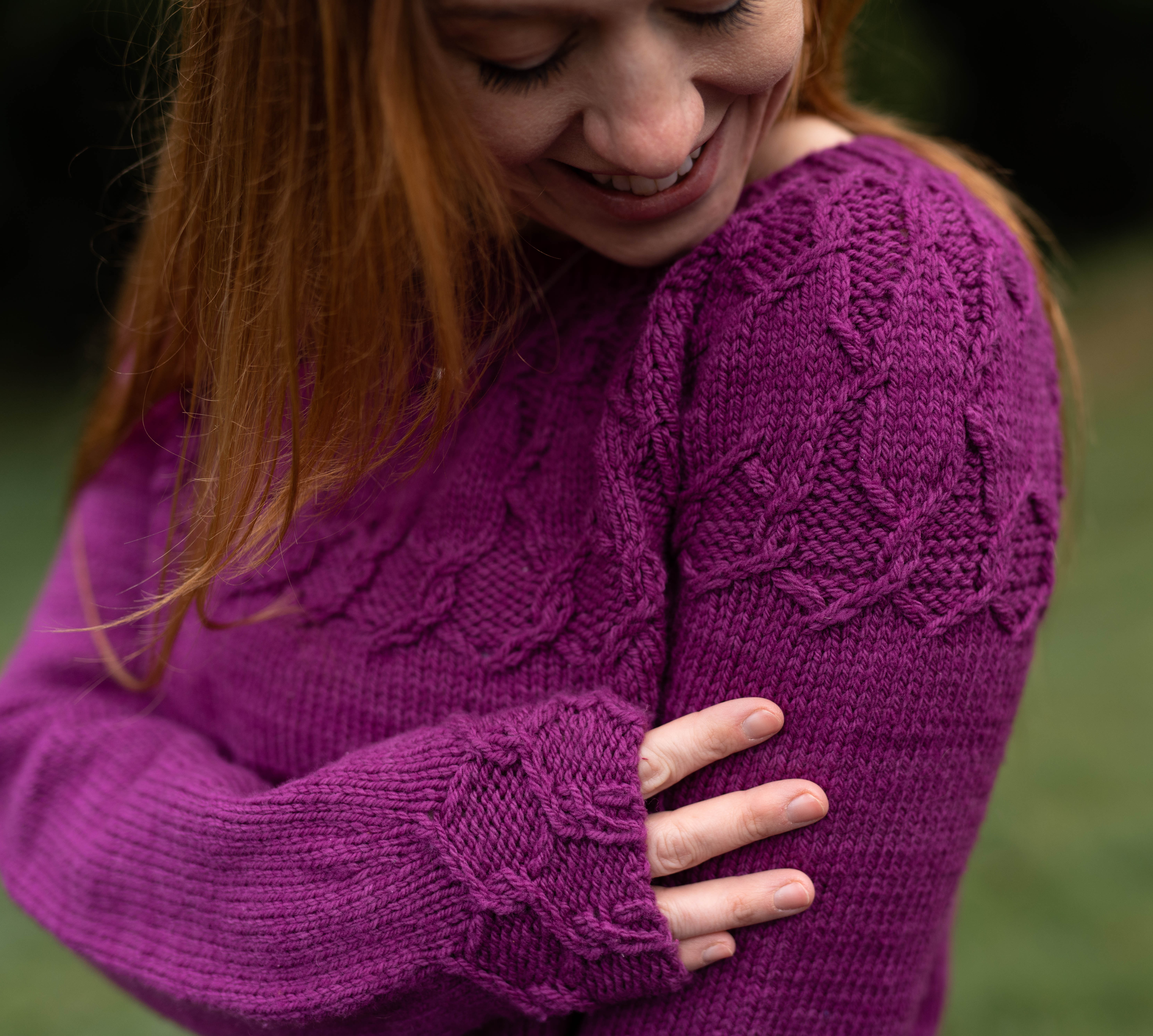
Alcyone can be purchased as a part of the e-book on Ravelry and on Payhip. On January 5 the entire collection is $15. The price increases as patterns are added, ending with a selling price of $28. It’s available in both English and Spanish.
- Click here to buy Alcyone Sweater as a part of the Rise Up Collection on Payhip
- Click here to buy Alcyone Sweater as a part of the Rise Up Collection on Ravelry
My Best Tip for Choosing a Sweater Size:
Study the intended wearer’s favorite sweater. It should be in the same weight as the chosen pattern. Compare it to the schematic of the pattern for choosing a base size and any modifications. The favorite sweater does not need to be hand knit, or even a yoke sweater, if the knitter will measure across the same places as in the schematic.
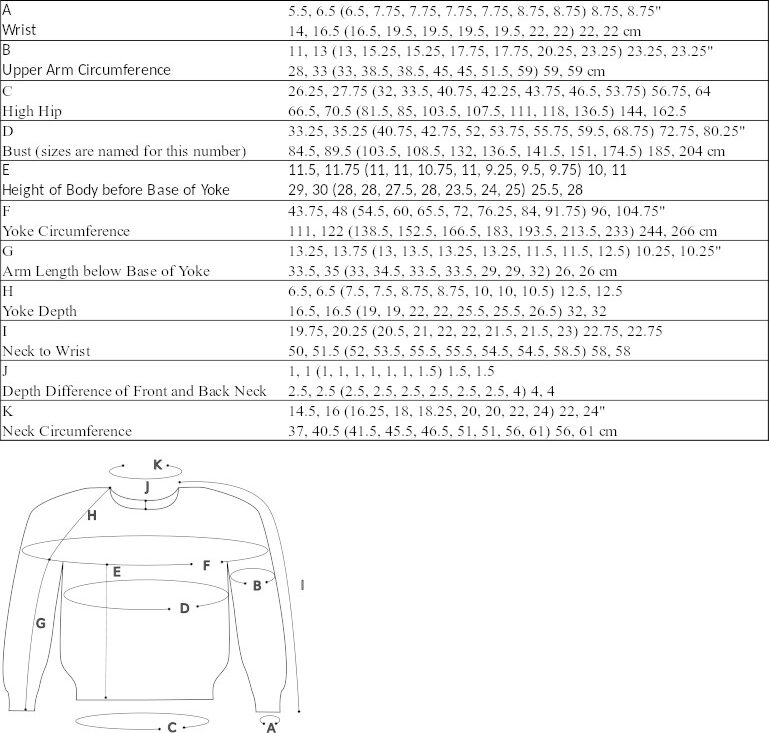
As I graded Alcyone, I tried to make as wide a size range as I could, while keeping the yoke stars in proportion for each size. There are 5 yoke sizes each with their own size star. The sweater sizes followed the available stitch counts, giving me roughly 4” between sizes.
Description of Alcyone Pattern
In Alcyone, the sleeves and body are cylinders with smaller ribbing. There is a wedge of short rows and raglan decreases to fit the curve of the bottom of the armscye, and to raise the back of the neck. It is topped by the cone portion for the upper arms and shoulders. Susanna Winter has a lovely blog post about adjusting the fit of circular yoke sweaters, that should help if you need to raise or lower the back neck. This pattern is written 1.5”, 3.5 cm higher in the center back neck than the center front. If the intended wearer’s back neck is higher, include 2 short rows for every .25”, .7 cm further needed, but do not continue to make raglan decreases after the calculated amount. If the intended wearer’s back neck is shallower, make 2 fewer short rows for each .25 ”, .7 cm needed, but adjust the raglan decreases to compensate.
Links for Modification Techniques
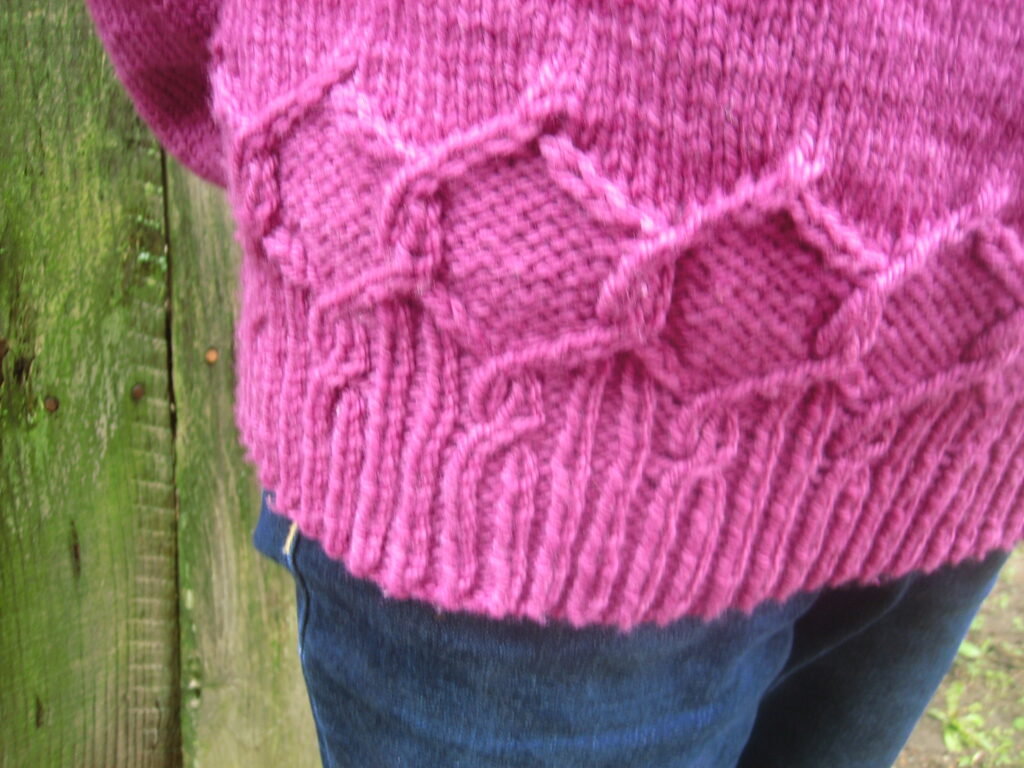
As Amy Herzog writes, Frankensizing is great. The Knitter is not limited to putting the same sleeves, yoke and body together that I did, and may add bust darts, but the stitch counts need to relate to each other this way once the alterations are done:
(Sleeves sts x 2) + (Body sts) + (any bust dart stitches) – (underarm sts X 4) – (raglan decrease rounds x 8) – (any evenly spread decreases) = (yoke base) X (yoke repeats)
This post on the “Magic Formula for Increases and Decreases.” should help getting the parts to line up in by an even decrease round for any stray stitches; for instance, a larger wrist with a smaller arm, a smaller waist with a larger body, bust darts directly into a larger size of the yoke instead of decreased away into the yoke for the size suggested for the body, etc.
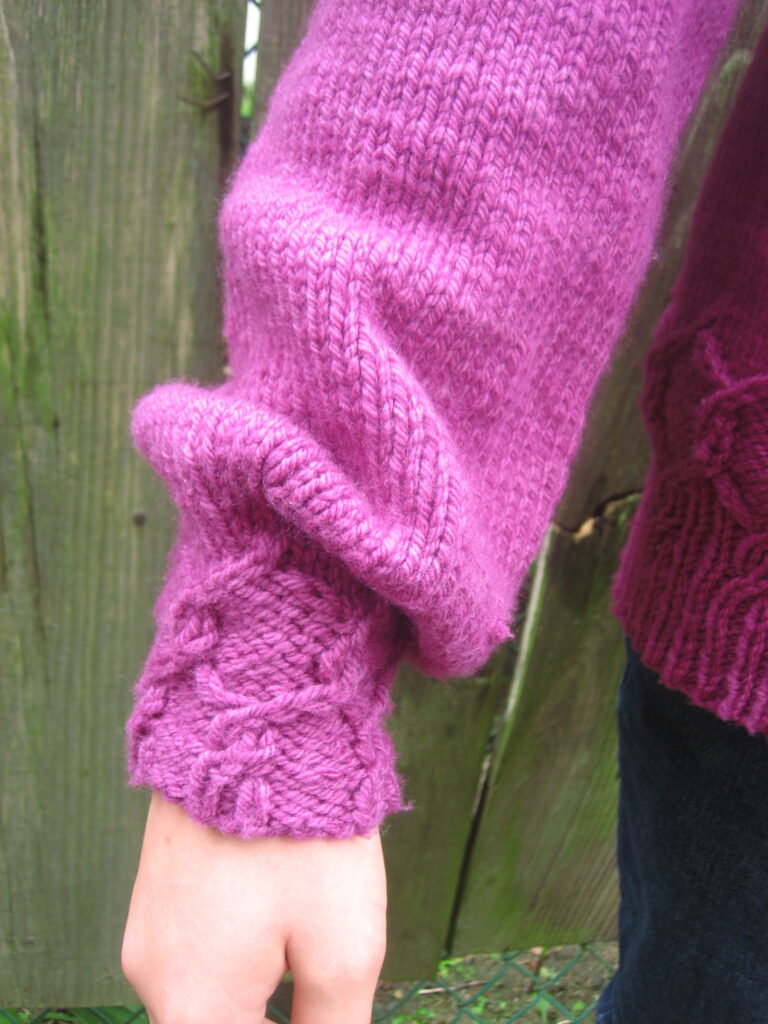
Speaking of wrists, it’s been a long time since we’ve been knitting tight ribbings on small needles, then switching to larger needles for a sleeve poof. Tight wrists are abominations. My Technical Editor insisted that I warn you all to try on the sleeves early. Use a larger wrist and have less poof if need be, especially in the 3 smallest sizes.
Bust Darts
Does the intended wearer like bust darts? It is easy to add vertical darts, or short row darts, or both in the stockinette below the yoke. See This Knitty Article or watch this video from Amy Herzog and Rowan.
Yoke (Armscye Depth)
How deep does the intended wearer like their armscyes to fall? If they prefer deeper underarms than the schematic indicates, the knitter may wish to go up a yoke base size, with fewer repeats. If the wearer talks with their hands and swings their arms a lot, a shallower underarm might be called for. In considering yoke size, sloping shoulders are accommodated by fewer repeats of a taller yoke, broad shoulders by more repeats of a shallow yoke. If there is a contradiction between the way the knitter knows the wearer to move, and the sweater shape the intended wearer prefers, follow the favorite sweater of the wearer (if you are knitting for yourself, flip a coin?). Armscye depth is really individual, and people wear the sweaters that they feel comfortable in.
Underarm
How many underarm stitches does the intended wearer like set aside? This is probably best measured off of their favorite sweater. As long as the bottom yoke numbers are reached, these numbers can be varied.
Raglan Decreases
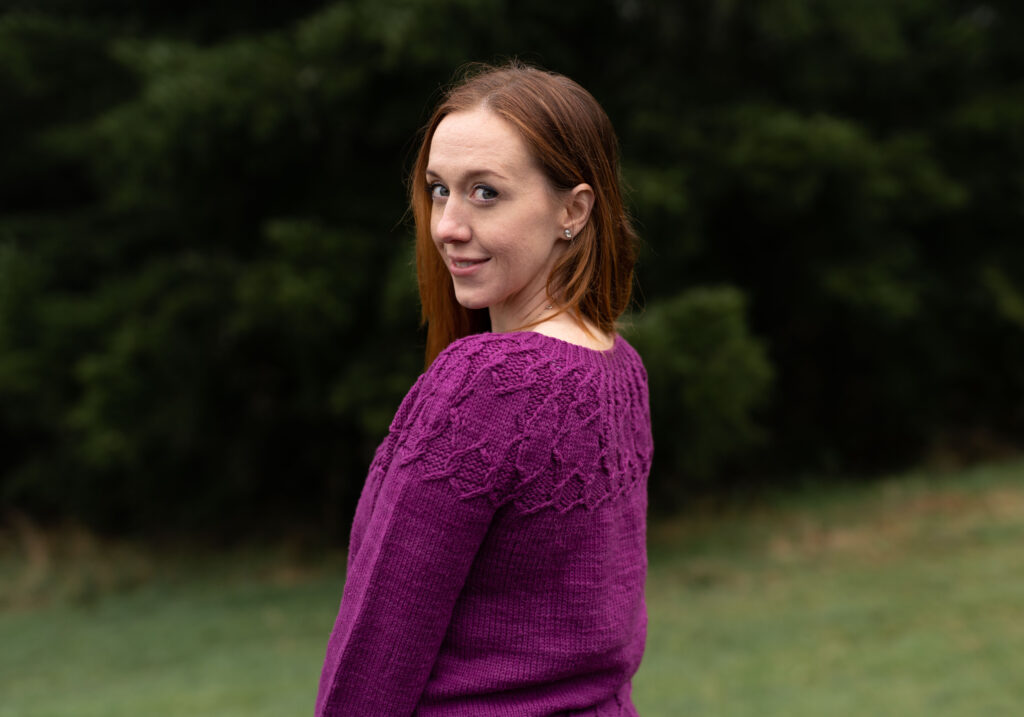
The raglan decreases are written as paired decreases, so if more decreases are needed in the back or front, they can be taken asymmetrically, as long as the stitch count for the yoke is reached, and there is an odd number of stitches between the underarm markers in the front so that there is a central stitch in the center front.
Choosing a Yoke Size
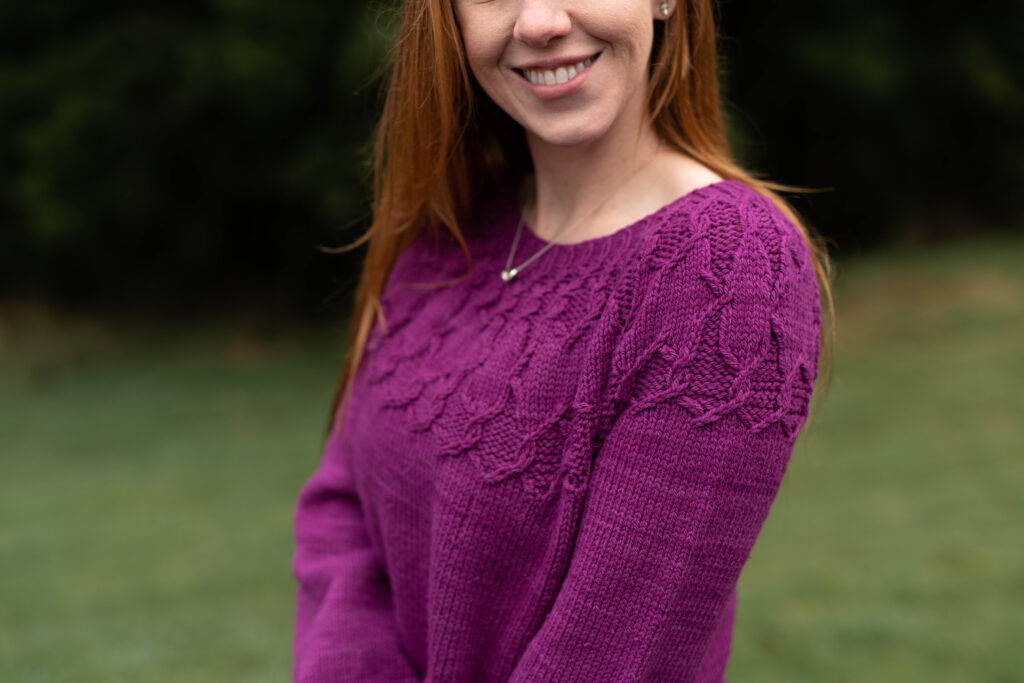
If a different sized yoke is chosen than the one written up, the lengths of the body and sleeve will also need to change. The total length of the sweater in the back is the yoke height, plus the back neck wedge, plus the length of the body and sleeves. If a higher yoke is chosen the sleeves and body are shorter. If a lower yoke is chosen, the sleeves and body are longer. These will most likely need adjustment in any case though.
With a differently sized yoke, the knitter will also need to calculate adjustments in the underarm stitches and raglan decreases to get to the new stitch count at the base of the yoke. The neckline will also change, check to make sure it’s neither too wide nor too tight. If it’s too wide, add more decreases in pattern 6 rounds from the top. If it’s too tight, skip some of the decreases at the top.
Sleeve Placements
Some wearers have a broad back, some a narrow one. Some have a wide bust that needs the sleeves attached further back than the midpoint. If the intended wearer is cooperative, the knitter can place the sleeves and body on holding string and try them on the intended wearer to check sleeve placement, sleeve and body lengths and if the bust darts are helping. I did find a big difference in how the Cormo yarn draped and fulled before and after blocking so the knitter may wish to block the pieces while they are on the needles or holding string so that the effect is as close as possible to the finished product.
Conclusion
If the wearer is not at all used to bespoke clothing, aiming to fit Alcyone like their favorite sweater in this weight is a better plan than a fitting. Think of all those movies where the tailor jabs an uncooperative character with a pin!
- Let me know how these tips helped. Christine at christineguestdesigns dot com or comment below.
- I am thinking of making sister sweaters to this one with variations, please let me know what design variations you think would be lovely.
- I want to see your projects! Please link up your photos on Ravelry and on Instagram with the hashtag #Alcyoneyokesweater
- If substituting yarn, give consideration to matching fiber and fiber properties as closely as possible to get similar results.
Alcyone can be purchased as a part of the e-book on Ravelry and on Payhip. On January 5 the entire collection is $15. The price increases as patterns are added, ending with a selling price of $28. It’s available in both English and Spanish.
